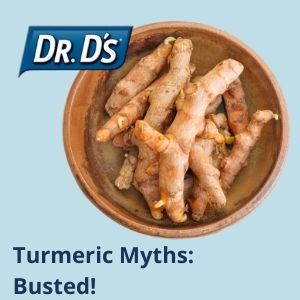
Turmeric Myths: Busted!
Share
Turmeric is a brilliant ancient spice, packed full of nutrients and healing properties. There is a lot of misinformation and confusion surrounding turmeric, so we wanted to take some time out to bust the most common turmeric myths for you! Have a look.
MYTH 1
"Turmeric is just an anti-inflammatory”
Turmeric is a powerful anti-inflammatory which gives it its clout against diseases such as cardiovascular disease, cancer, diabetes, Alzheimer’s/Dementia and much more. However, there is much more to turmeric than that! Research also suggests that turmeric has powerful antiviral, antibacterial and even antifungal properties and therefore can be used as an immune booster as well.
MYTH 2
"Turmeric and Curcumin is the same thing.”
Turmeric is very well known for “curcumin.”
Turmeric and curcumin are often used interchangeably and are a source of common confusion.
Turmeric is an ancient spice that comes from the Curcuma longa plant.
Curcuminoids, compounds extracted from the turmeric root, are important nutrients. Curcumin is the most important curcuminoid as it contains the greatest amount of medicinal properties. Curcumin is therefore a very special component of the entire turmeric root but it is not the same thing as turmeric. Most of the research over the last 10 years have focused on just curcumin.
What most people do not know is that curcumin (although very important, yes) only comprises 3 percent of the entire turmeric root!
For example, one of the compounds outside of curcumin is called aromatic-turmerone that’s been discovered to offer neurological benefits in cases of brain injury and neuroprotective benefits against diseases such as Alzheimer’s and Parkinson’s.
A few other compounds include: alpha-turmerone and beta-turmerone, turmeric oil, demethoxycurcumin, 5’-methoxycurcumin, and dihydrocurcumin. These are also powerful antioxidants and have similar yet unique properties to curcumin. All of them work together synergistically for impressive medicinal results.
The whole turmeric root, and not just curcumin, is very powerful and has been used traditionally across medicinal systems for centuries. That is why we created Dr. D’s Ultra BioTurmeric to be a full-spectrum turmeric, meaning it includes much more than just curcumin!
MYTH 3
"Turmeric needs black pepper in order to be effective."
Turmeric is poorly absorbed by the gut. As such, turmeric supplements usually contain additives to help increase absorption.
For example, black pepper inhibits a process called glucuronidation by the liver.
Glucuronidation prevents excessive levels of toxins into the body.
Black pepper is sometimes added to turmeric supplements to bypass this process and increase absorption.
At Dr. D’s we prefer to use formulas without such additives and therefore have created a technology which overcomes the problem of poor absorption without needing black pepper.
MYTH 4
Turmeric is best when used from the fresh root.
Using the fresh or dried form of turmeric will provide the same health benefits discussed.
However, it generally takes more of a fresh spice or herb to equal the amount within a supplement.
This is why we recommend a full-spectrum turmeric supplementation, this way you know how much you are getting in every capsule. There is no guessing!
MYTH 5
I can just take turmeric when I am in pain.
Although many patients have found quick relief from taking turmeric when in pain, it is not meant to be taken as an instant pain reliever such as ibuprofen.
Instead, it is meant to be part of a regular wellness routine as there are benefits outside of pain management that require regular dosing to obtain optimal effects.
Moreover, Dr. D’s revolutionary turmeric supplement has been clinically proven to remain in the bloodstream for up to 24 hours, so it is working around the clock to fight inflammation and pain. This means it does not only work to relieve acute (or short-term bouts of) pain, but it is continually acting to keep pain at bay. Always thoroughly read and follow directions on the label.